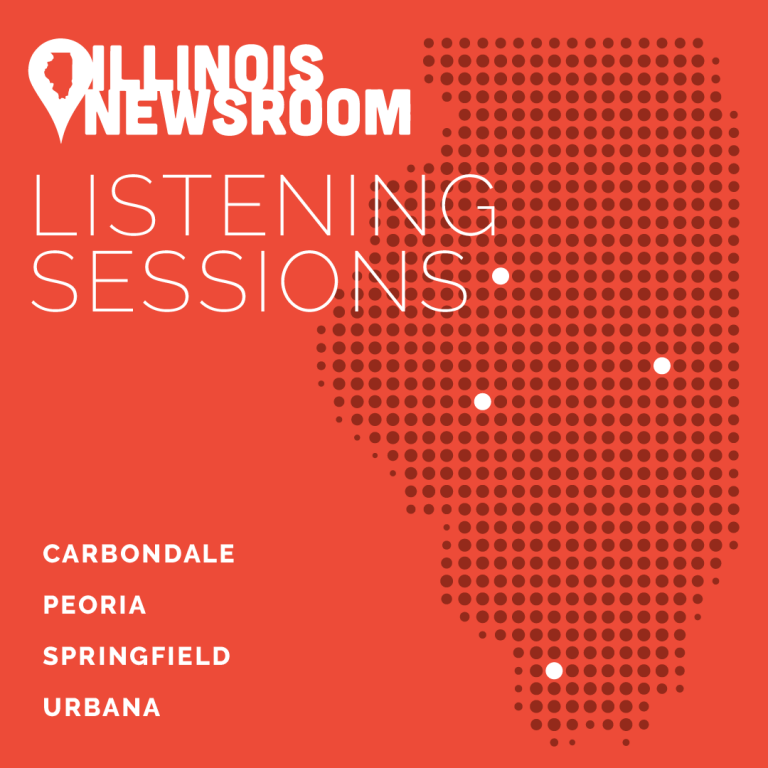Illinois Newsroom holds Listening Sessions across the state to hear what’s top of mind for community members. Unlike a formal interview, listening sessions are prompted with open-ended questions and discussions are community member led. These meetings often occur for hours, building bonds between our team and communities and giving us direction for deeper-dive reporting series that have regional and statewide perspective.
So far, we’ve sat down with dozens of community members working in government, healthcare, education, criminal justice, environment, social services, and commerce, and we will continue to share our findings with you. We are dedicated to a listening first journalism model, so please reach out to us at anytime!
Where Health Happens in Illinois
Where does health happen? In a doctor’s office? A hospital? What about in homes, schools, jobs, and parks?
The definition of “healthy” no longer relies as much on positive experiences with healthcare providers. That’s the main takeaway from Illinois Newsroom’s recent listening sessions from across the state. Community leaders in education, healthcare, economic development, and philanthropy are focusing their efforts on improving what are known as Social Determinants of Health, things like employment, access to transportation, neighborhood and school safety, and education.
Sarah Patrick, Administrator for the Jackson County Health Department, describes the shift in how communities approach health like this:
“The things we had as standards in public health — good immunizations, good access to food, safe food and water and air — those haven’t gone away, but more and more has been added on as we define what it means to be healthy, define what it means to have good well being, to be happy. These all influence what it means to be healthy.”
Given this new understanding of health, bettering the physical and mental wellbeing of Illinoisans will require a lot of collaboration across sectors. Here are some of the current priorities we’ve heard in housing, education, and healthcare and how they intersect.
Housing
Karen Davis heads Peoria’s new Local Initiatives Support Corporation (LISC) office and works to bring together leaders across Peoria to spark development and investment in historically disinvested neighborhoods. LISC looks not only to municipalities and private real estate developers for collaboration, but also to partners like OSF Healthcare, noting that safe neighborhoods and stable housing can lead to better health.
Davis looks to the work of LISC’s Toledo, Ohio office as a model for success. A March 2018 press release from Toledo-based health care system ProMedica says the system is partnering with LISC for a $45 million project: “New investments and grants will focus on helping families grow employment skills and boost incomes and education. The goal is to improve community safety, finance healthy homes and vibrant businesses, and ensure communities have quality greenspace and jobs. It is a model that can be replicated in communities across the country.”
While Davis works toward similar goals in Illinois, she’s also identified other issues, including the lack of affordable housing and its impact on the education system. With rising housing costs, Davis has heard from Illinois educators that attracting teachers to school districts that can only pay $41,000 a year is near impossible.
Education
On top of a statewide teacher shortage, toxic stress in children creates a strained education system in Illinois. Danielle Chynoweth, Cunningham Township Supervisor in Urbana, sees children suffering from housing insecurity or homelessness struggle in schools. A lack of mental health professionals in schools leaves many students without support to develop the resiliency they need to cope with multiple forms of trauma.
Some children with difficult home lives act out behaviorally, leading to disciplinary action that Kelly Wickham Hurst, the head of Springfield’s Being Black at School, says is unjustly meted out to black students. As Illinois Newsroom’s previous reporting shows, school districts across Illinois are working to change disciplinary policies to support children who have experienced trauma, and Hurst says teacher bias must be investigated to create equitable solutions for non-white students.
Healthcare
According to representatives from Southern Illinois Healthcare, education will be one of the topics for their next Community Health Needs Assessment (CHNA) as they transition to studying the social determinants of health. Their 2015 CHNA shows statistics about cancer, cardiovascular disease and its risk factors diabetes and obesity, and mental health, but 2020’s CHNA will look at research around poverty, transportation, housing and food access. There is agreement among many healthcare professionals across the state that issues like the opioid crisis and the rising suicide rate are symptoms of larger societal issues.
Working on a more integrated and collaborative approach to health seems likely to benefit healthcare systems as much as individual Illinoisans. Illinois’ budget impasse affected the public health system immensely according to Sarah Patrick from Jackson County Health Department. During that period there was not only a loss of money and services, but also a loss of talent and knowledge. She concludes that “there is a system discussion that needs to take place.”


